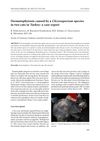TLDR Fluconazole is somewhat effective for skin-related sporotrichosis but less so for severe forms, and should be a backup treatment.
The study evaluated the effectiveness of fluconazole in treating 30 patients with sporotrichosis, a fungal infection. Patients received daily doses ranging from 200 to 800 mg. Among the 14 patients with lymphocutaneous sporotrichosis, 71% were cured. However, only 31% of the 16 patients with osteoarticular or visceral sporotrichosis responded to the treatment, with no documented cures. The study noted minimal toxic effects, except for alopecia in five patients. The findings suggested that fluconazole was only modestly effective and should be considered a second-line treatment for patients unable to take itraconazole.
63 citations
,
September 1995 in “Annals of internal medicine” Fluconazole can cause temporary hair loss, which stops after reducing or stopping the drug.
 6 citations
,
November 2018 in “Antimicrobial agents and chemotherapy (Print)”
6 citations
,
November 2018 in “Antimicrobial agents and chemotherapy (Print)” Fluconazole can cause hair loss, but the exact cause is unknown.
 July 1996 in “Annals of Internal Medicine”
July 1996 in “Annals of Internal Medicine” Taking high doses of fluconazole for a long time can cause reversible hair loss.
 4 citations
,
July 1996 in “Annals of Internal Medicine”
4 citations
,
July 1996 in “Annals of Internal Medicine” High doses of fluconazole can cause reversible hair loss.
 4 citations
,
December 2013 in “Veterinární medicína”
4 citations
,
December 2013 in “Veterinární medicína” Two cats and their owner in Turkey were successfully treated for a rare fungal infection with fluconazole.
 July 1996 in “Annals of Internal Medicine”
July 1996 in “Annals of Internal Medicine” Long-term high-dose fluconazole can cause reversible hair loss.
 April 2014 in “Jurnal Biomedik : JBM”
April 2014 in “Jurnal Biomedik : JBM” An 8-year-old girl had nail and hair issues that improved without specific treatment, but fungal nail infection was hard to cure.





